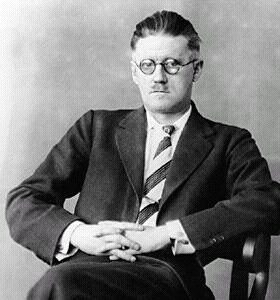 James Joyce
(1882-1941) Study Questions
James Joyce
(1882-1941) Study Questions  James Joyce
(1882-1941) Study Questions
James Joyce
(1882-1941) Study Questions Key terms: epiphany, short story, 'West Briton,' class consciousness, insecurity, high-brow vs. low-brow, Irish Renaissance
The headnote to Joyce in the textbook and the parts about him in the 20th Century introduction are very good, so I won't repeat them here, only counsel you to read them closely and take notes.
The classic definition of a short story is that it has a definite, formal construction; finds its unity in many things besides plot; is distinguished from the novel in that it tends to reveal character through actions, the purpose of the story being distinguished when the reader comes to know what the true nature of the character is; and has a sense of being consciously ‘made’ and ‘artificially’ shaped. To what extent are these elements present in The Dead?
Jonathan Swift invented the terms "high-brow" and "low-brow" to identify art aimed at discerning audiences vs. art aimed at the undiscerning masses. This implies a kind of social snobbery involved in literacy. Where do you feel Joyce stands in the high-brow/low-brow debate and why is that important in the early 20th Century?
Joyce and Yeats were writing in what we call the "Celtic Renaissance" or "Irish Renaissance" period of British literature. As you saw when you read Spenser in the "Perspectives on Race and Difference" section for Early Modern Literature, and when we read Swift's A Modest Proposal, the mainstream British literary tradition had always treated Ireland as a third-world country, a nation of outsiders. That's of course not entirely true; Ireland had a healthy Celtic tradition, filled with mythology and literary achievement, before Cædmon wrote his Hymn. But because of British colonial viewpoints, that literary tradition wasn't respected in Britain. In the late Victorian and in the Modern period, Irish writers rebelled against this British snobbery, celebrating their own history, their own viewpoints, and the stimulation of a literature that was "authentic in spirit" for Ireland, as Bill Harmon calls it. This period saw a revival in Irish poetry, in Irish theatre, and, in Joyce, the greatest flowering of Irish fiction--and probably modern fiction--that could be imagined. Joyce himself was an exile from Ireland, living in Paris, but Ireland haunts every page of his writing--and writing as both an Irishman and as a modern writer struggling with alienation, sexism, class consciousness, and the uncertainties of faith, Joyce summarizes many of the themes we've been working with all semester.
Here are some study questions to help you identify the four themes in the story.
1. On p. 1139, why does Gabriel "color" as if he has made a mistake when Lily becomes upset about the subject of men? What might his reaction reveal about his ability to relate to women and to people of other social classes?
3. On 1140, why is Gabriel anxious about the after-dinner speech he must make? How does he see himself in relation to his hosts, Aunts Kate and Julia? Does the narrative voice offer any enlightenment about Gabriel's thoughts here -- or elsewhere in the story? When he finally gives the speech, on p. 1152-55, what does it reveal about him and his views?
4. On 1141, Gretta explains why she is wearing galoshes. What picture of her marriage with Gabriel emerges from the interchange (spoken and unspoken) between Gretta, Gabriel, and Aunts Kate and Julia? From 1157 on, what does the text reveal about Gabriel's understanding of his wife as an individual? For what reasons does he desire her? How does the introduction of Michael Furey change that understanding? What does it make Gabriel think about?
5. On 1142, what mistake does Mr. Browne make? How does his conduct hint at the rift that is beginning to open up between the men and the women in Joyce's story? When Mr. Browne talks about the monks, what other themes is Joyce introducing?
6. On 1144-46, why is Miss Ivors successful in getting under Gabriel's skin? What things has she implied about him that he finds unpleasant? What's going on in Irish politics that Joyce is weaving in here?
7. On 1148, what is revealed about Julia's abortive singing career? Is she a good singer? What kept her from going further with her singing? Why is the subject of Julia dropped or diverted so quickly?
8. From 1140 onwards, why does the weather become important to your perception of the story? By the story's end, on 1164, we hear that the snow is falling all over Ireland, on both the living and the dead. What values does the snowfall have by this point?